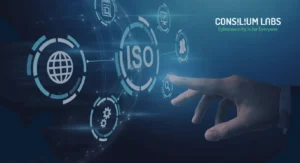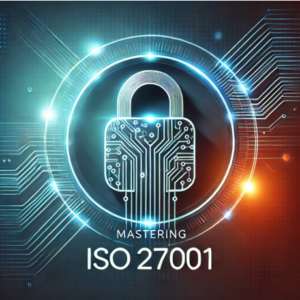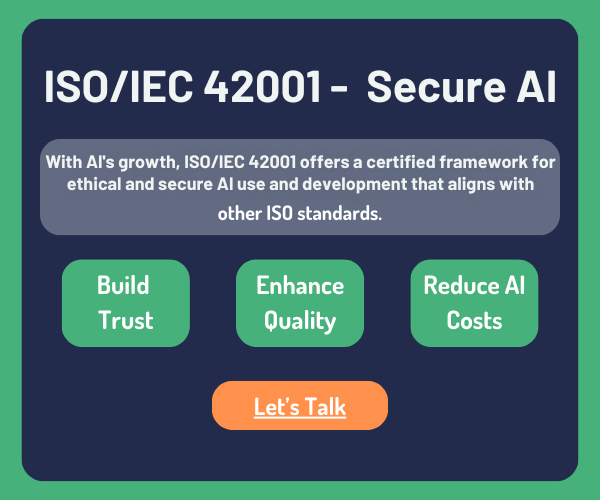In this article
How to Prepare for ISO 42001 Certification: A Step-by-Step Guide
- Shaheer Tariq

ISO/IEC 42001:2023 is the world’s first international standard for AI Management Systems – a structured framework to ensure the ethical, transparent, and secure development and use of artificial intelligence. Introduced in late 2023, this standard provides organizations with requirements and controls to build a trustworthy AI management system covering areas like risk management, AI impact assessment, lifecycle processes, and supplier oversight. In essence, ISO 42001 sets a global benchmark for responsible AI governance, ensuring AI is developed, deployed, and operated with proper oversight – a practice increasingly critical as businesses adopt AI at scale . Many governments are also introducing AI regulations (such as the EU AI Act) and view ISO 42001 as a cornerstone for compliance. Gearing up for ISO 42001 certification not only fosters trust and innovation in AI, it also helps future-proof your organization against emerging laws and ethical guidelines.Many governments are introducing AI regulations—such as the EU AI Act—and increasingly view ISO 42001 as a cornerstone for responsible compliance.
But if your team is wondering “Where do we start?”—you’re not alone.
This guide provides a clear, actionable roadmap to help your organization prepare for ISO 42001 certification and build a governance system that scales with your AI footprint.
Why ISO 42001 Certification Matters
Getting certified demonstrates:
- Commitment to AI ethics and transparency
- Alignment with regulatory frameworks (e.g., EU AI Act, NIST AI RMF)
- Reduced risk exposure and enhanced audit readiness
Brand trust across enterprise clients and partners
Why Is ISO 27001 Important?
In today’s world, cybersecurity and Infosec (Information Security) are crucial. ISO 27001 helps organizations minimize the risk of data breaches, comply with regulations, and build trust with customers. The standard focuses on both preventing risks and improving your systems over time.
Why AIMS Is Critical for ISO 42001
ISO 27001 is broken into several sections (called clauses) that outline the steps you need to follow to build and maintain an effective ISMS. While the document contains ten clauses, Clauses 4-10 are the ones you need to focus on for compliance.
ISO 42001 is built entirely on the foundation of a functioning AIMS. Certification requires your organization to demonstrate a structured, auditable approach to:
- AI governance and accountability
- Risk and impact assessment
- Bias and fairness controls
- Human oversight and intervention
- Lifecycle documentation and traceability
- Data quality and security
- Continuous learning and system improvement
Without AIMS in place, organizations simply cannot meet the baseline requirements for ISO 42001 certification (UNESCO, 2023).
Core Components of a Scalable AIMS
Component | Purpose |
AI Policy & Objectives | Define your commitment to responsible AI aligned with organizational goals |
Governance Structure | Assign accountability—AI risk officer, ethics board, compliance lead |
AI Risk Management Process | Identify, assess, and mitigate risks specific to AI models and systems |
Data Governance Controls | Manage data quality, privacy, lineage, and security |
Human Oversight Protocols | Ensure decisions are explainable and overrideable by human reviewers |
Monitoring & Logging | Continuously track AI behavior, drift, and system performance |
Training & Awareness | Equip teams with clear roles and responsibilities under AIMS |
Audit & Documentation | Maintain full traceability for reviews, incidents, and external audits |
Step-by-Step: How to Build an ISO 42001-Compliant AIMS
Step 1: Define Your Scope
Start by defining the scope of your AI Management System and identifying all AI systems in that scope. Start by defining the scope of your AI Management System and identifying all AI systems in that scope:
- Which business units, processes, and AI applications will be covered?Which business units, processes, and AI applications will be covered?
- What departments or geographies are affected?
- Are external vendors part of the AI lifecycle?
🔍 Start with an internal AI inventory.
Step 2: Conduct a Gap Assessment
Assess your AI systems against ISO 42001 expectations. Identify what exists—and what’s missing:
- Governance roles
- Ethical review mechanisms
- Human oversight controls
- Risk documentation
- Data lineage tracking
💡 Use a certification partner to help build your roadmap.
Step 3: Build Your AI Management System (AIMS)
Your AIMS is the backbone of ISO 42001 compliance. It should include:
- AI risk assessments and ethical use policies
- SOPs for oversight and escalation
- Roles like “AI Compliance Lead” or “Model Owner”
- Ongoing review and retraining processes
💡 Already ISO 27001 certified? Reuse and extend your policies.
Step 4: Prepare Your Statement of Applicability (SoA)
For each Annex A control, your SoA must:
- Indicate applicability
- Justify exclusions
- Link to governance documentation
🧾 Think of the SoA as your certification playbook.
Step 5: Run Internal Audits
Before you go into a third-party audit:
- Perform a full AIMS audit internally
- Identify evidence gaps
- Schedule a readiness review (optional)
🏁 Assign an internal lead to drive audit preparation.
Common Pitfalls to Avoid
Issue | Fix |
Siloed documentation | Centralize model governance assets and training logs |
No compliance training | Develop AI ethics training for teams involved in development and ops |
Unclear vendor responsibility | Use contracts to require documentation and attestations from vendors |
Start Strong With Consilium Labs
We help you prepare for ISO 42001 certification through gap assessments and audit readiness evaluations, ensuring your AI Management System aligns with the standard before formal certification begins.
📩 Book a discovery session to prepare your ISO 42001 roadmap.
Related Articles
Let's get in touch
Start your audit now. Achieving cybersecurity audit can be complex. We have made it our mission to simplify the process, giving you access to the professional expertise you need to prepare your company for the future. Get in touch with us today!





